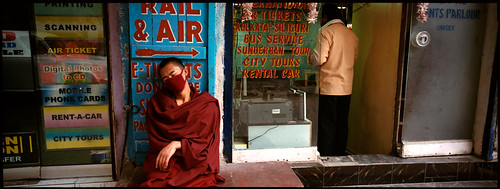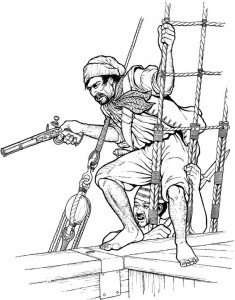![]()
![]()
 Off to Calcutta for a four-day weekend, where I’ll take extra care when crossing the storied Howrah Bridge, which is apparently in structural danger thanks to the ceaseless toxic expectorations of the city’s millions. (Photo by Flickr user Bradford Daly.)
Off to Calcutta for a four-day weekend, where I’ll take extra care when crossing the storied Howrah Bridge, which is apparently in structural danger thanks to the ceaseless toxic expectorations of the city’s millions. (Photo by Flickr user Bradford Daly.)
Laurie Garrett on The Black Nile
“Dan Morrison is too young to have been part of the Gonzo movement. But if Hunter Thompson decided to travel the Nile, from its Ugandan source to Alexandria, encountering gun-toting whackos, crazed religious zealots, scary profiteers and a rich cast of characters in one of the world’s most contested regions — well, I think he would have loved to share his trek with Morrison.
“Fasten your seat belts, readers!”
— Laurie Garrett, Pulitzer Prize winner and author of The Coming Plague.
Sudan: Where Children Vote
My newest piece, a bit truncated, on the opinion pages of today’s New York Daily News. Apparently I’m keeping Charles Krauthammer’s seat warm.
Sudan: How to Throw an Election
My new article, published yesterday in Slate, looks at the twisted politics behind Sudan’s recent election. Check it out.
Nick Clegg is no Harry Perkins.
The surge in popularity by Nick Clegg and the Liberal Democrats ahead of Britain’s general election is the kind of story an American can get behind. Fresh face, clean values, no nukes, green as green, come out of nowhere — etc.
We love that stuff.
As brought home by recent statements on the part of his boarding school subordinate, Louis Theroux (ask them, not me), Clegg is a fully-paid member of Britain’s ruling class. But the notion of a relative political outsider coming within shooting distance of power recalled to me the brilliant career of my favorite British prime minister.
Now, the fact that Harry Perkins never lived is no reason discount his achievements. Continue reading “Nick Clegg is no Harry Perkins.”
Sudan: A Rare Fix That Wasn’t
 In a rare spot of good news to come out of Sudan’s elections, it appears the former rebels of the Sudan People’s Liberation Movement have won the governorship of Blue Nile state. That is to say, the southern rebels, competing in a rigged election, were victorious in a northern state .
In a rare spot of good news to come out of Sudan’s elections, it appears the former rebels of the Sudan People’s Liberation Movement have won the governorship of Blue Nile state. That is to say, the southern rebels, competing in a rigged election, were victorious in a northern state .
It’s the SPLM that’s made the announcement, [Update: It’s now official.] declaring that the National Election Commission has called the race for their candidate, Malik Agar. If this holds up – if the NEC, which has proved itself to be an extension of the ruling National Congress Party, publicly declares Malik Agar the winner – it will stand as the greatest reversal of what has proven to be a multi-multi-million-dollar sham election. Continue reading “Sudan: A Rare Fix That Wasn’t”
Sudan: The Carter Center’s Preliminary Statement
Here’s a link to the Carter Center’s 21-page preliminary statement on Sudan’s elections. I breezed through the bullets, and the center’s key points seem to be:
1) It wasn’t a fair election.
2) Still, the exercise was a necessary one to fulfill provisions of the Comprehensive Peace Agreement, thereby making it legal to hold next year’s (dis)unity referendum, in which the south will vote to leave Sudan.
3) It was good practice. (For the next unfair election?)
and, importantly
4) Southerners didn’t get a fair shake either, thanks to intimidation by the Sudan People’s Liberation Army.
It seems accurate based on my reading and interviews. The language is neutral, not condemnatory, which will annoy some. And it further confirms what a lousy deal this has been for so many people working towards real pluralism and democracy in Sudan.
My guess is there’s probably enough praise in the document to allow the Bashir regime to declare victory, despite a similar statement from the European Union.
For details, read after the jump, and by all means check the excellent reporting at the Sudan Tribune and Radio Dabanga — and please do let me know what you think.
Continue reading “Sudan: The Carter Center’s Preliminary Statement”
A Travesty, a Logistical Nightmare, Irrelevant, Democracy
Four ways of looking at Sudan’s national elections
 Sudan’s first multiparty elections in 24 years started yesterday in an atmosphere of anger, hope and confusion. The last election, in 1986, followed a people’s uprising that removed a military dictator. How times change. Today another military dictator – Field Marshal Omar Hassan al-Bashir, an indicted war criminal — is Sudan’s leading candidate for president.
Sudan’s first multiparty elections in 24 years started yesterday in an atmosphere of anger, hope and confusion. The last election, in 1986, followed a people’s uprising that removed a military dictator. How times change. Today another military dictator – Field Marshal Omar Hassan al-Bashir, an indicted war criminal — is Sudan’s leading candidate for president.
Befitting Africa’s biggest, and perhaps most complicated, country, there are several ways of looking at Sudan’s elections: Continue reading “A Travesty, a Logistical Nightmare, Irrelevant, Democracy”
Avast!
Recent articles on book piracy.
In Peru, from Granta.
On the Internet, from The Millions.
And in India and Bangladesh. Plenty of piracy in Pakistan too. And why wouldn’t there be? Pakistan has a poor selection of books and they’re pretty expensive by local standards. Same in Bangladesh.
Can’t publishers in Latin America and South Asia produce swift and inexpensive editions to compete with the pirates? That’s what movie distributors have done, selling cheap dvds of first-run films in Russia, and south and central Asia to beat the pirates to the punch.
Want to know how your country’s black economy compares with its neighbors? Check out Havocsope’s online database of the global black market. They follow it all – flesh, drugs, software, movies and books.
What does any of this have to do with Sudan’s historic elections? Nothing. But I hope to have a piece that subject published very soon.
Listen closely and you can hear your brain sizzle.
 From GQ: “The only honest way to think of our cell phones is that they are tiny, low-power microwave ovens, without walls, that we hold against the sides of our heads.” Continue reading “Listen closely and you can hear your brain sizzle.”
From GQ: “The only honest way to think of our cell phones is that they are tiny, low-power microwave ovens, without walls, that we hold against the sides of our heads.” Continue reading “Listen closely and you can hear your brain sizzle.”

